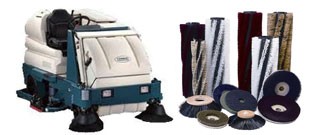|
 Sweeper Parts Yukon - Yukon is the smallest and westernmost of Canada's 3 federal territories. The name derives from the Yukon River and translates to mean "Great River" in Gwich'in.
During 1898, the territory was formed from the rump of the Hudson's Bay Company's North-Western Territory and known as "the Yukon." During the year 2003, the federal government's most recent update of the Yukon Act confirmed the name to be "Yukon," instead of "Yukon Territory," as the current usage standard. The Yukon Government recognizes First Nations languages although the territory is officially bilingual with English and French.
Situated in the Kluane National Park and Reserve, Mount Logan is the highest mountain in Canada at 5,959 metres or 19,551 feet in height. It is likewise the second highest mountain in North America after Alaska's Mount McKinley. There is little precipitation in the territory and the climate is Arctic and subarctic, causing long and frigid winters and short summer months.
Mining has always been the major trade within the Yukon region. Zinc, asbestos, gold, silver, copper and lead are the most mined heavy metals and minerals. In 1870, the government acquired the land from the Hudson's Bay Company. During eighteen ninety eight, they split it from the Northwest Territories to fill the need for local government caused by the increase in the population because of the gold rush.
Lots of prospectors moved through the area during the gold rush. This period has been covered and recorded by recognized authors Robert W. Service and Jack London. The early days of the Royal Canadian Mounted Police were likewise important during this time. The many outdoor recreation opportunities combined with the scenic natural wonders make tourism the 2nd most popular business.
Hydroelectricity contributes to the local economy. The manufacturing trade produces handicrafts, clothing and furniture. Conventional industries like for instance fishing and trapping have declined over the years. Now, the government sector is the largest employer within the territory. They directly employ approximately 5,000 people out of a labor force of around 12, 500.
"Larger than life" is the motto of the tourism trade for the territory. The appeal of the pristine nature of the region is key to Yukon tourism. There are several outfitters and guides to aid the numerous anglers, hunters and nature lovers who come to the area. The abundance of lakes and rivers make it an ideal spot for individuals who make use of canoes and kayaks. There are several trails to walk on and ride. Access to the backcountry by snowmobile or air is great for those who get pleasure from winter activities. There are opportunities to snowboard and ski and climb the highest peaks within Canada. Families could hike together up smaller mountains. There are ice climbing and dog sledding companies around as well.
The various sporting events and cultural activities held each and every year in the Yukon is able to attract a lot of tourists, artists and participants from all parts of the world. The most popular events include the Yukon International Story Telling festival, Frostbite Music Festival, Yukon Quest, Dawson Music Festival, Northern Lights Centre, Sourdough Rendezvous, the Whitehorse Fish Ladder, Takhini Hot Springs as well as other Klondike Gold Rush activities and memorials.
| |
















